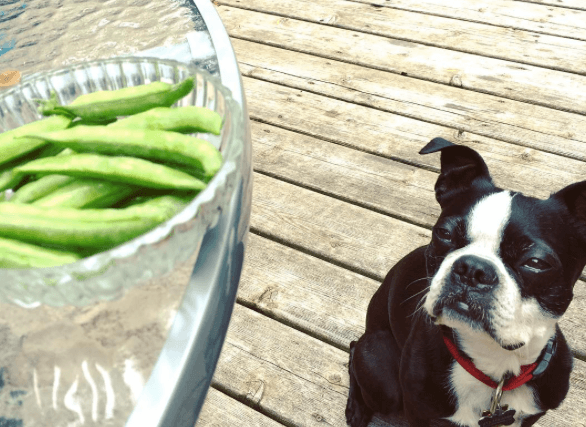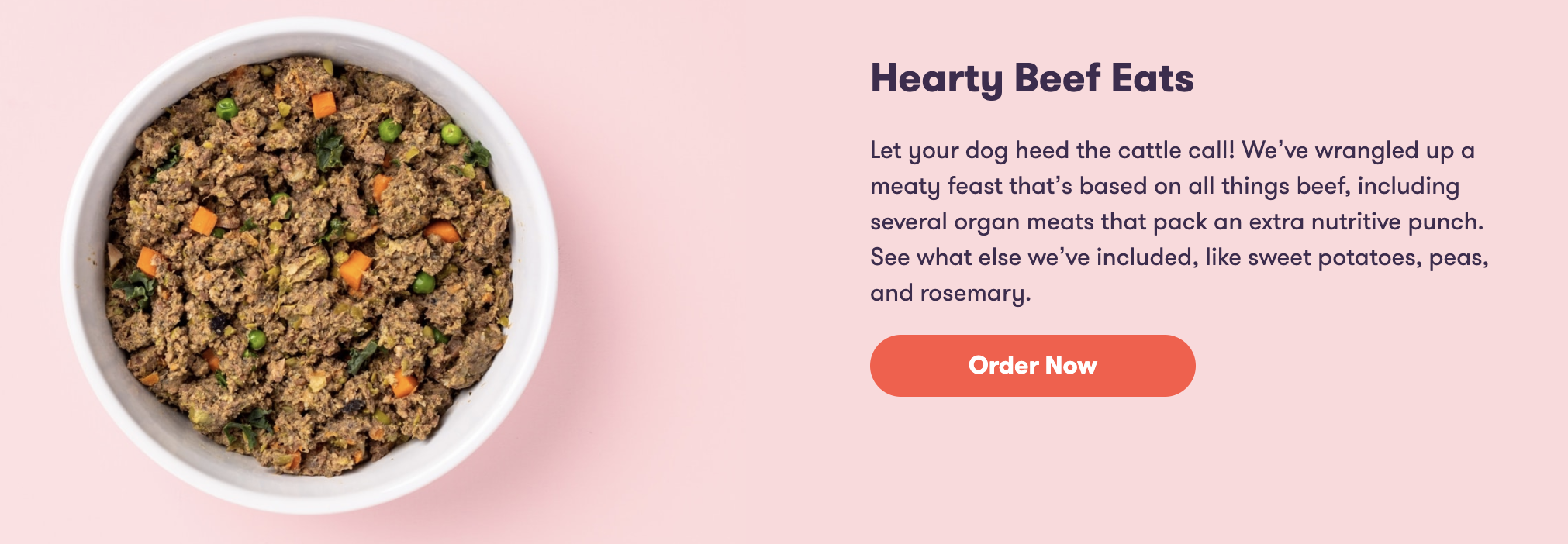Hey Ollie blog readers! We’re offering you an exclusive 60% OFF your starter box! Try now!
Fiber is an important component in your dog’s diet. It helps to promote regular bowel movements and helps maintain a healthy colon.
Seeing that your pup’s food contains dietary fiber is important, but there’s more. Did you know that there are different types of fiber that provide different benefits to your dog? And finally, not all fiber is created equally so we looked at the best ways to get the fiber your pup needs.
What is fiber?
Simply defined, fiber is the part of grains and vegetables that doesn’t become absorbed through digestion. There are two main types of fiber your dog needs to stay healthy. First, soluble fiber absorbs water and is fermented in the intestines, releasing fatty acids that promote the health of the lining of the gut. Then, your dog also needs insoluble fiber. This type of fiber also absorbs water, but it doesn’t ferment. Most fiber-rich foods contain a mix of both soluble and insoluble fiber so it’s easy to ensure that your dog is getting both.
Benefits of fiber-rich foods
When it comes to the benefits of fiber, it’s the ideal remedy for dogs who suffer from both diarrhea andconstipation because insoluble fiber acts like a sponge by absorbing excess water and acid (aka diarrhea) and soluble fiber acts like a broom, sweeping things along and preventing roadblocks (aka constipation).
Similarly, adding fiber is a go-to solution for dogs who need to drop a few pounds. Typically low in calories, fiber absorbs water and creates a sensation of being fuller, longer.
Another benefit of ensuring your dog gets enough fiber is less issues with anal glands. Smaller dogs, in particular, can suffer from anal gland problems in which the glands become plugged and irritated. Fiber can help “bulk up” stools, applying pressure to the glands from the inside and allowing them to excrete naturally.
While these benefits help your dog in their everyday health, ensuring that your dog is getting enough fiber has some long term benefits. The same fiber that promotes a regular poop cycle will help keep the cells and bacteria in your pup’s colon healthy. And the same fiber that helps your dog reach and maintain a healthy weight and can help dogs with blood sugar problems, including diabetes.
Risks of a fiber-heavy diet
As with anything in your dog’s diet there can be too much of a good thing. So, when it comes to fiber, your dog might be like Goldilocks. They’ll need to find the balance between not enough fiber (as it can cause issues) and too much fiber (which can also cause issues).
Aside from diarrhea and constipation, not enough fiber in a dog’s diet can lead to troubles like blocked anal glands and long-term health issues including colon diseases and obesity,which can affect your pet’s quality of life.
On the other hand, too much fiber causes food to move through your dog’s digestive system too quickly, keeping their body from absorbing essential nutrients from their food. Something else to keep in mind if you’re using fiber to regulate your dog’s weight.
Dropping pounds too fast could lead to unintended problems, just like it does in humans. These can range from nutritional deficiencies to metabolic disorders. This is why it is so important to involve your vet in your dog’s weight loss plan. They can help spot these issues and help you ensure your pup is losing weight in a sustainable and healthy way.
Sources of dietary fiber for dogs
To see how much fiber your dog is already getting in their diet, you can read the label on their food. You should be looking for fiber-rich ingredients like vegetables and grains and avoid those listing “powdered cellulose,” which is a blanket term for subpar ingredients that literally could include shredded paper, tree pulp and cotton. These are cheap, starchy fillers that offer virtually no nutritional benefit.
If you’re concerned that your dog might need more fiber, you can supplement with fresh fruit and vegetables including:
Does your dog need more fiber in their diet?
If your dog is healthy, active, pooping regularly and at an ideal weight, they are likely getting an adequate amount of fiber.
However, if your dog is having trouble with digestion or weight, it could be that their fiber intake isn’t ideal. Talk with your vet about either changing your dog’s diet or supplementing. Your vet will also do some diagnostic testing like bloodwork to help rule out other more serious medical issues like thyroid conditions or cancers that can also cause dogs to have issues with their weight, stools or digestion.
Fiber supplements for dogs
Since sharing your Metimucil with your dog is probably not the best idea, you might be looking at dietary fiber supplements for your pup too. With so many products on the market, this can be overwhelming since we know not all sources of fiber are created equally or of the same quality.
Before you offer your dog a fiber supplement, chat with your vet first to make sure your dog actually needs one. Then ask your vet about what type (or souce) of fiber and dosage is most appropriate for your dog. Then, start offering the supplement slowly, working up to the recommended dose over a few days or weeks so that your dog’s digestive system isn’t overwhelmed.
At Ollie, we know how important the right amount and right kinds of fiber are to your pup. Our veterinary nutritionist helps us create Recipes that are balanced and rich in fiber to help keep your pup’s digestive system running optimally. We include human-grade ingredients like kale and pumpkin so you don’t have to supplement with additonal sources of fiber.
The Ollie blog is devoted to helping pet parents lead healthier lives with their pups. If you want to learn more about our fresh, human-grade food, check out MyOllie.com.
Tagged As:

The nutrition your dog needs,
the food they want.

Enjoying our articles? Subscribe our Newsletters and get new articles directly to your inbox
You might also like
26 August 2025
4 MINS READ
Is Fresh Dog Food Safe?
If you’re thinking about switching your dog to a fresh food diet, you might be asking yourself: “Is fresh dog food safe?” It’s a smart question—because feeding fresh means you’re worki…
by Ollie Pets
26 August 2025
4 MINS READ
How Do I Know How Much Fresh Dog Food To Feed?
If you’ve switched your pup to fresh food, you’re probably wondering: “How much fresh dog food should I feed?” It’s not as simple as scooping kibble from a bag—fresh food is more nutri…
by Ollie Pets
26 August 2025
4 MINS READ
Do I Need To Cook Fresh Dog Food?
If you’ve just started exploring fresh dog food, you might be wondering: “Do I need to cook it?” or “Is it raw or already cooked?” It’s a common question, especially with so many pet f…
by Ollie Pets








